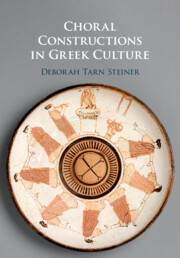 Choral Constructions in Greek Culture
Choral Constructions in Greek Culture Published online by Cambridge University Press: 20 May 2021
A fragment of Pindar preserved and identified by Athenaeus as a hyporcheme (14.631c = fr. 112 S.-M.) describes a Spartan parthenaic troupe (if the text is sound) as an ἀγέλα or ‘herd’. The term recurs in a second Pindaric composition, fr. 122 S.-M., where it again refers to a troupe of maidens, these expressly figured as cows, who take part in a choral-style performance en route to a sacrifice. In a third usage of the expression in fr. 70b.22 S.-M., the Pindaric performers of this dithyramb apply it to the herd of wild beasts, their species undefined, whose collective dancing in a cacophonous chorus made up of gods, nymphs, animals and other sonorous objects is said to ‘enchant’ Dionysus (ὁ δὲ κηλεῖται χορευοίσαισι κα[ὶ θηρῶν ἀγέλαις); in this instance the scene imagined by the singers stands as the template and paradigm for their own more earth-bound choreia, similarly staged by way of tribute to the god as they participate in his signature choral genre.
To save this book to your Kindle, first ensure no-reply@cambridge.org is added to your Approved Personal Document E-mail List under your Personal Document Settings on the Manage Your Content and Devices page of your Amazon account. Then enter the ‘name’ part of your Kindle email address below. Find out more about saving to your Kindle.
Note you can select to save to either the @free.kindle.com or @kindle.com variations. ‘@free.kindle.com’ emails are free but can only be saved to your device when it is connected to wi-fi. ‘@kindle.com’ emails can be delivered even when you are not connected to wi-fi, but note that service fees apply.
Find out more about the Kindle Personal Document Service.
To save content items to your account, please confirm that you agree to abide by our usage policies. If this is the first time you use this feature, you will be asked to authorise Cambridge Core to connect with your account. Find out more about saving content to Dropbox.
To save content items to your account, please confirm that you agree to abide by our usage policies. If this is the first time you use this feature, you will be asked to authorise Cambridge Core to connect with your account. Find out more about saving content to Google Drive.